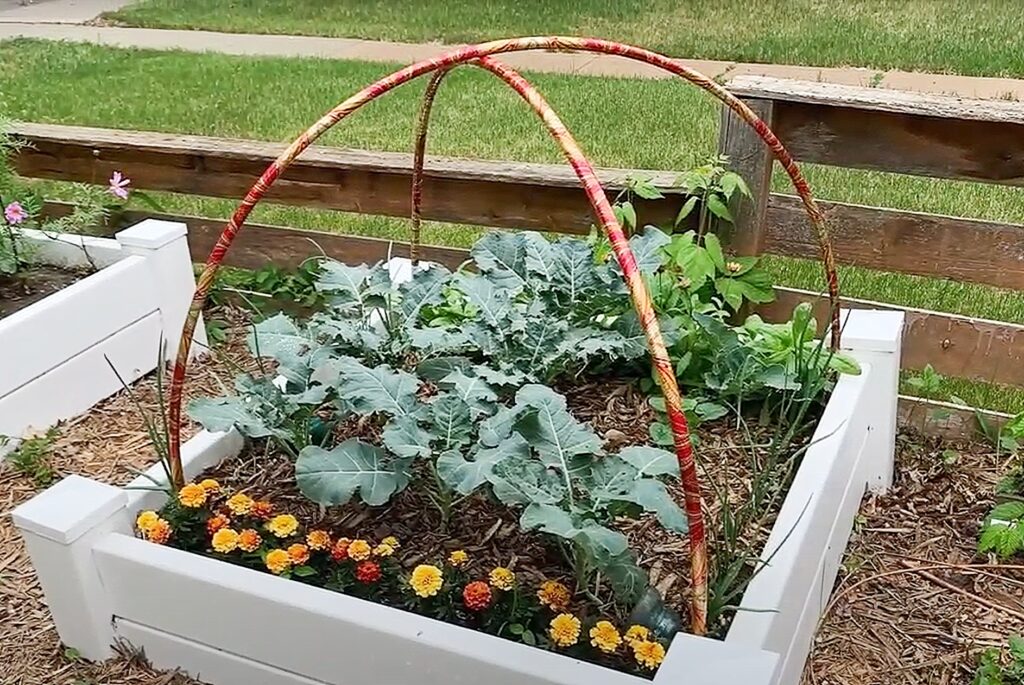To protect your garden from birds, use netting or install bird deterrents. Scare tactics can also be effective.
Birds can cause significant damage to your garden, eating fruits, vegetables, and seeds. Protecting your garden from these winged intruders ensures a healthy and productive space. Netting is one of the most effective methods, creating a physical barrier that birds cannot penetrate.
Bird deterrents, such as reflective tape or decoys, can also discourage birds from entering your garden. Scare tactics, like motion-activated sprinklers or noise devices, add another layer of protection. By implementing these strategies, you can enjoy a thriving garden free from bird-related issues.

Credit: lovelygreens.com
Physical Barriers
Protecting your garden from birds is important. Birds can eat seeds, plants, and fruits. One effective way to keep birds away is by using physical barriers. Physical barriers are items you place around or over your garden. These items stop birds from reaching your plants.
Netting Options
Netting is a popular choice for keeping birds out. It covers your plants and stops birds from getting to them. Here are some netting options:
| Type | Material | Benefits |
|---|---|---|
| Fine Mesh Netting | Nylon or Polyethylene | Protects small plants and fruits |
| Heavy-Duty Netting | Polypropylene | Lasts longer and is more durable |
| Bird Netting | Polyethylene | Lightweight and easy to install |
Fine mesh netting works best for small plants. It has tiny holes that birds cannot get through. Heavy-duty netting is stronger and lasts longer. It is great for larger gardens. Bird netting is light and easy to use. It is good for covering large areas quickly.
Diy Fences
You can build your own DIY fences to protect your garden. These fences stop birds from entering. Here is a simple way to build a garden fence:
- Gather materials: wooden stakes, wire mesh, and a hammer.
- Place stakes around your garden, spacing them evenly.
- Attach the wire mesh to the stakes using a hammer.
- Make sure the mesh is tight and secure.
DIY fences are effective and affordable. They can be customized to fit any garden size. You can also decorate them to make your garden look nice.
Using physical barriers is a great way to keep birds away. Try these methods to protect your garden and enjoy healthy plants.
Visual Deterrents
Protecting your garden from birds can be a challenge. Visual deterrents are effective ways to keep birds away. They use sight to scare birds off. Learn how to use scarecrows and reflective objects to protect your garden.
Scarecrows
Scarecrows are a classic bird deterrent. They look like humans to scare birds away. Place them where birds usually land. Move them every few days. This keeps birds guessing. Dress them in bright colors. Add shiny objects like old CDs to the scarecrow. This adds extra deterrence.
Use items like:
- Old clothes
- Hats
- Gloves
Make sure the scarecrow is tall. It should be at least 5 feet high. A taller scarecrow is more effective. Change its position often. This makes birds think it’s real.
Reflective Objects
Birds dislike shiny objects. They avoid areas with reflections. Use items like:
- Aluminum foil
- Old CDs
- Mirrors
Hang these objects around your garden. They catch the sunlight. The reflections scare the birds away. Place them on stakes or tree branches. Move them around every few days. Birds will stay away if they see these objects.
Make sure the objects are easy to move. This keeps the garden looking fresh. It also ensures birds don’t get used to them. Reflective objects are easy and cheap to use. They protect your garden effectively.
Auditory Deterrents
Birds can cause significant damage to your garden. Using auditory deterrents can help keep them away. These devices create sounds that birds find unpleasant. They are effective and easy to use. Below are some popular options.
Wind Chimes
Wind chimes can be both decorative and functional. The sounds they produce can scare birds away. Place them around your garden for the best effect. They work well in areas with frequent wind. Choose chimes with varied tones for better results.
Ultrasonic Devices
Ultrasonic devices emit sounds that humans cannot hear. Birds find these sounds disturbing. These devices can cover large areas. They are also safe for pets and children. Some models come with motion sensors for added efficiency.

Credit: www.meadowsfarms.com
Natural Predators
Protecting your garden from birds can be challenging. One effective method is to use natural predators. These predators help to keep unwanted birds away.
Birds Of Prey
Birds of prey are excellent at scaring off smaller birds. Owls and hawks are natural hunters. They keep your garden safe from pests. You can attract these birds by setting up perches.
- Install owl boxes in your garden.
- Use hawk decoys to deter smaller birds.
Owls hunt at night, while hawks hunt during the day. Both can be very effective. They reduce the number of birds eating your crops.
Domestic Pets
Domestic pets like cats and dogs can also help. They chase away birds from your garden. Dogs love to run and bark, scaring the birds.
- Train your dog to patrol the garden area.
- Ensure your cat is safe outdoors.
Make sure your pets are comfortable in the garden. A happy pet will keep birds at bay.
| Natural Predator | Effective Against |
|---|---|
| Owls | Small birds at night |
| Hawks | Small birds during the day |
| Cats | Birds and small animals |
| Dogs | Birds and larger pests |
Using natural predators is a great way to protect your garden. It keeps the balance of nature intact.
Plant Selection
Choosing the right plants can help protect your garden from birds. Certain plants are less appealing to birds, while others can be used strategically. Let’s dive into the best options for plant selection.
Bird-resistant Plants
Some plants naturally repel birds. These plants can help keep your garden safe. Here are some bird-resistant plants you can consider:
- Lavender: The strong scent of lavender keeps birds away.
- Marigolds: Birds dislike the taste and smell of marigolds.
- Yarrow: This plant’s texture is unappealing to birds.
- Mint: The smell of mint deters birds effectively.
Companion Planting
Companion planting involves growing plants together that benefit each other. This method can help protect your garden from birds. Here are some examples:
| Companion Plants | Benefits |
|---|---|
| Sunflowers and Tomatoes | Sunflowers attract birds away from tomatoes. |
| Marigolds and Vegetables | Marigolds repel birds and protect vegetables. |
| Basil and Peppers | Basil’s scent keeps birds away from peppers. |
Using these plants can create a bird-resistant garden. Experiment with different combinations for the best results.
Feeding Alternatives
Birds can be a delightful addition to any garden, but sometimes they can cause damage. One way to deter birds from eating your plants is by offering them alternative food sources. This strategy helps to keep your garden safe and flourishing.
Bird Feeders
Installing bird feeders can be an effective way to divert birds from your garden plants. Place the feeders away from your garden. Fill them with seeds that birds love. Common seeds include sunflower seeds, millet, and cracked corn. This provides a tasty treat for the birds. It keeps them occupied and away from your fruits and vegetables.
Here is a simple table showing seed types and the birds they attract:
| Seed Type | Birds Attracted |
|---|---|
| Sunflower Seeds | Cardinals, Finches, Chickadees |
| Millet | Sparrows, Juncos, Towhees |
| Cracked Corn | Jays, Doves, Quails |
Decoy Plants
Planting decoy plants can also help protect your garden. These plants are more attractive to birds than your main crops. Decoy plants can be strategically placed around your garden. This encourages birds to focus on them instead of your prized plants.
Here are some common decoy plants:
- Sunflowers
- Marigolds
- Buckwheat
Decoy plants act as a natural lure for birds. They satisfy the birds’ hunger and keep your main garden safe. This method is simple and eco-friendly.
Chemical Repellents
Keeping birds away from your garden can be challenging. Using chemical repellents is one effective method. These products deter birds without causing them harm. Below, we explore some safe sprays and homemade solutions.
Safe Sprays
Safe sprays are designed to repel birds without harming them. These sprays often contain natural ingredients. They are easy to apply and very effective.
Look for sprays with peppermint oil or cinnamon oil. These oils are safe for plants and animals.
| Spray Type | Ingredients | Effectiveness |
|---|---|---|
| Peppermint Oil Spray | Peppermint oil, water | High |
| Cinnamon Oil Spray | Cinnamon oil, water | Medium |
Homemade Solutions
Homemade solutions are another great option. They are cost-effective and easy to make. Here are a few popular recipes:
- Garlic Spray: Mix garlic cloves with water. Spray on plants.
- Vinegar Spray: Combine vinegar and water. Apply to garden areas.
- Chili Pepper Spray: Blend chili peppers with water. Use a spray bottle.
These solutions are natural and safe. They keep birds away without harming them.
Maintenance Tips
Maintaining your garden regularly is key to keeping birds at bay. Implementing consistent maintenance tips can greatly reduce the damage caused by birds. Let’s dive into some practical steps to protect your garden.
Regular Inspections
Inspect your garden weekly to spot early signs of bird activity. Look for damaged plants and scattered feathers. Keep an eye on fruit trees and vegetable patches. Early detection helps in taking quick action.
Seasonal Adjustments
Adjust your bird deterrent methods based on the season. Birds have different behaviors in different seasons. For example, use reflective tape in spring and summer. In winter, set up bird nets to protect your plants.
| Season | Maintenance Tips |
|---|---|
| Spring | Use reflective tape and scarecrows. |
| Summer | Install bird nets and wind chimes. |
| Fall | Prune trees and bushes regularly. |
| Winter | Cover plants with bird nets. |
Follow these tips to maintain a bird-free garden throughout the year. Regular inspections and seasonal adjustments are crucial for effective bird control.

Credit: shiftingroots.com
Frequently Asked Questions
How To Keep Birds Away From Garden?
You can use bird netting, scare devices, or reflective materials. These methods deter birds effectively without harming them.
What Plants Deter Birds?
Plants like marigolds, lavender, and chives can help keep birds away. Their strong scents are unappealing to birds.
Are Scarecrows Effective Against Birds?
Scarecrows can be effective if they are moved regularly. Birds will become used to stationary scarecrows over time.
How To Protect Fruit Trees From Birds?
Cover fruit trees with netting to prevent birds from eating the fruit. Ensure the netting is secure.
Conclusion
Protecting your garden from birds is essential for healthy plants. Implement various methods to keep birds at bay. Use bird nets, scare tactics, and proper plant placement. Consistent efforts will ensure a thriving garden. Enjoy a beautiful, bird-free garden with these effective strategies.
Happy gardening!
